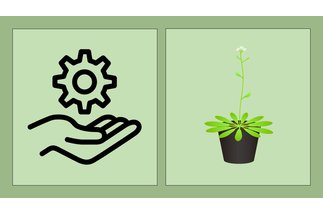Plant Cultivation and Transformation

The scientific work concentrates on abiotic stress tolerance especially under field conditions and the development of data management structures for phenotyping and metadata capture.
Improvement of drought tolerance in potato
Potato is the 3rd most important food crop with more than 50 % being produced in developing countries. Potato is water efficient, but not drought tolerant. As climate changes, maintenance of yield stability requires efficient selection for drought tolerance. Because yield-based selection in arid environments is effective but slow, marker-assisted selection may speed up tolerance breeding substantially.

Fig. 2. Big-bag system for drought-stress trials under fluctuating climate conditions.
In the projects TROST and VALDIS TROST coordinated by Karin Köhl, a consortium of research institutes and breeders endeavoured to find and validate phenotypic markers for drought tolerance of potato.
We evaluated drought tolerance based on the relative tuber starch yield in drought stressed plants compared to well-watered plants in pot and field trials. We found significant genetic variability of drought tolerance in the German potato gene pool (Sprenger et al., 2015). Cultivars of contrasting drought tolerance differed in their metabolite and transcript patterns (Sprenger et al., 2016). The combination of transcript or metabolite levels in random-forest models allowed to predict drought tolerance based on leaf samples independent of the agro-environment (Sprenger et al., 2017). We tested the models in selection assays including lines from a segregating population that were selected based either on a model-predicted tolerance from leaf measurements or on tolerance estimated from yield data obtained in drought stress trials. The selected lines were subsequently characterised for drought tolerance in ten pot, big-bag (see Fig. 2) and field trials. We found that both methods identified lines with superior drought tolerance compared to the mid-parent mean. The marker-based method found fewer lines but was much faster.

Fig. 3. Autonomous laser imaging and infrared-thermometry of a segregating potato population under control and drought conditions.
Presently, in collaboration with the International Centre for Potato (CIP), we develop morphological drought tolerance markers based on continuous measurements of growth parameters by autonomous laser scanning and infrared thermometry (see Fig. 3).
Phenotyping and data management
Plant breeding and genetics require fast and exact phenotyping that is reliable and reproducible by other scientists independent of the location. Standardised data storage facilitates statistical evaluation and compliance with the FAIR principles. We developed a simple and cost-efficient system, the Phenotyper, which employs mobile devices for on-site data entry and open-source software for data management (Köhl and Gremmels, 2015). The Phenotyper system is available to the scientific community (summary and source code). We employed the system in the data management pipeline that supported our potato drought tolerance projects (Billiau et al., 2012).
Past data management projects yielded a plant resource and experiment management that is based on the LIMS software Nautius (Köhl et al., 2008) and a management system for plant transformation (Köhl and Gremmels, 2010) and plant cultivation. These systems are in continuous use since 2005 or 2009, respectively.
Real world Arabidopsis

Fig. 4. Arabidopsis under field conditions. Temperature (A) and light intensity fluctuations (B) in the field during seed production of Arabidopsis thaliana. Platform for microclimate measurement (C). Arabidopsis field trial (D). Phenotype of Arabidopsis thaliana under climate-controlled conditions (E) and field conditions (F). Different anthocyanin accumulation in Arabidopsis accessions grown on natural sandy soil in response to photo chilling (G, H).
Arabidopsis research is predominantly done in controlled environments, in which the phenotypic effects of up to two environmental factors are studied. In natural environments, plants face multiple and fluctuating stresses simultaneously, which can create a conflict situation. In this situation, the evolutionary adaptation or the physiological acclimation to one factor can be disadvantageous with the respect to another factor (trade-off). The fluctuating conditions in the field can result in major differences between phenotypes observed in controlled conditions and in the field. For example, mutants that were indistinguishable from the wildtype under controlled conditions, lost fitness in the field. We therefore developed field and polytunnel-screenhouse trial systems for Arabidopsis and continuously monitor the microclimate on these sites. (Laitinen, 2015; Annunziata et al., 2017; Annunziata et al., 2018). The group manages site 42 of the GRENE net project.
LED
The model species Arabidopsis thaliana is mostly grown under controlled conditions in growth chambers under fluorescent lamps. Light emitting diodes (LED) were suggested as an alternative to improve energy efficiency and long-term stability of light quality. We compared the phenotype and metabolome of several Arabidopsis ecotypes grown under fluorescent lamps and various LEDs. The effect of the altered light quality was small compared to the effect of plant age and diurnal cycle (Köhl et al., 2017). Therefore, we switched from fluorescent lamps to LED in 2017.
Isotope Labelling
Tobacco, rice and Arabidopsis labelled with stable, heavy isotopes of C, N and S were produced for metabolite identification by high-resolution mass spectrometry and metabolomics (Matthes et al., 2014; Giavalisco et al., 2011).







